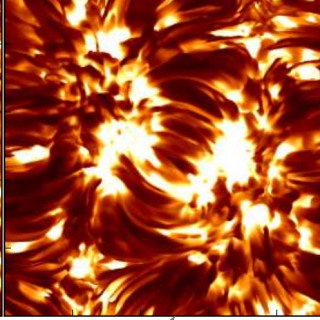Bibcode
Orozco Suárez, D.; Asensio Ramos, A.; Trujillo Bueno, J.
Referencia bibliográfica
Astronomy and Astrophysics, Volume 566, id.A46, 12 pp.
Fecha de publicación:
6
2014
Revista
Número de citas
64
Número de citas referidas
53
Descripción
Context. Determining the magnetic field vector in quiescent solar
prominences is possible by interpreting the Hanle and Zeeman effects in
spectral lines. However, observational measurements are scarce and lack
high spatial resolution. Aims: We determine the magnetic field
vector configuration along a quiescent solar prominence by interpreting
spectropolarimetric measurements in the He i 1083.0 nm triplet obtained
with the Tenerife Infrared Polarimeter installed at the German Vacuum
Tower Telescope of the Observatorio del Teide. Methods: The He i
1083.0 nm triplet Stokes profiles were analyzed with an inversion code
that takes the physics responsible for the polarization signals in this
triplet into account. The results are put into a solar context with the
help of extreme ultraviolet observations taken with the Solar Dynamic
Observatory and the Solar Terrestrial Relations Observatory satellites.
Results: For the most probable magnetic field vector
configuration, the analysis depicts a mean field strength of 7 gauss. We
do not find local variations in the field strength except that the field
is, on average, lower in the prominence body than in the prominence
feet, where the field strength reaches ~25 gauss. The averaged magnetic
field inclination with respect to the local vertical is ~77°. The
acute angle of the magnetic field vector with the prominence main axis
is 24° for the sinistral chirality case and 58° for the dextral
chirality. These inferences are in rough agreement with previous results
obtained from the analysis of data acquired with lower spatial
resolutions.
A movie is available in electronic form at http://www.aanda.org
Proyectos relacionados

Magnetismo, Polarización y Transferencia Radiativa en Astrofísica
Los campos magnéticos están presentes en todos los plasmas astrofísicos y controlan la mayor parte de la variabilidad que se observa en el Universo a escalas temporales intermedias. Se encuentran en estrellas, a lo largo de todo el diagrama de Hertzsprung-Russell, en galaxias, e incluso quizás en el medio intergaláctico. La polarización de la luz
Ernest
Alsina Ballester